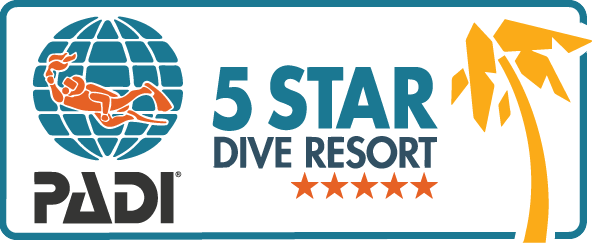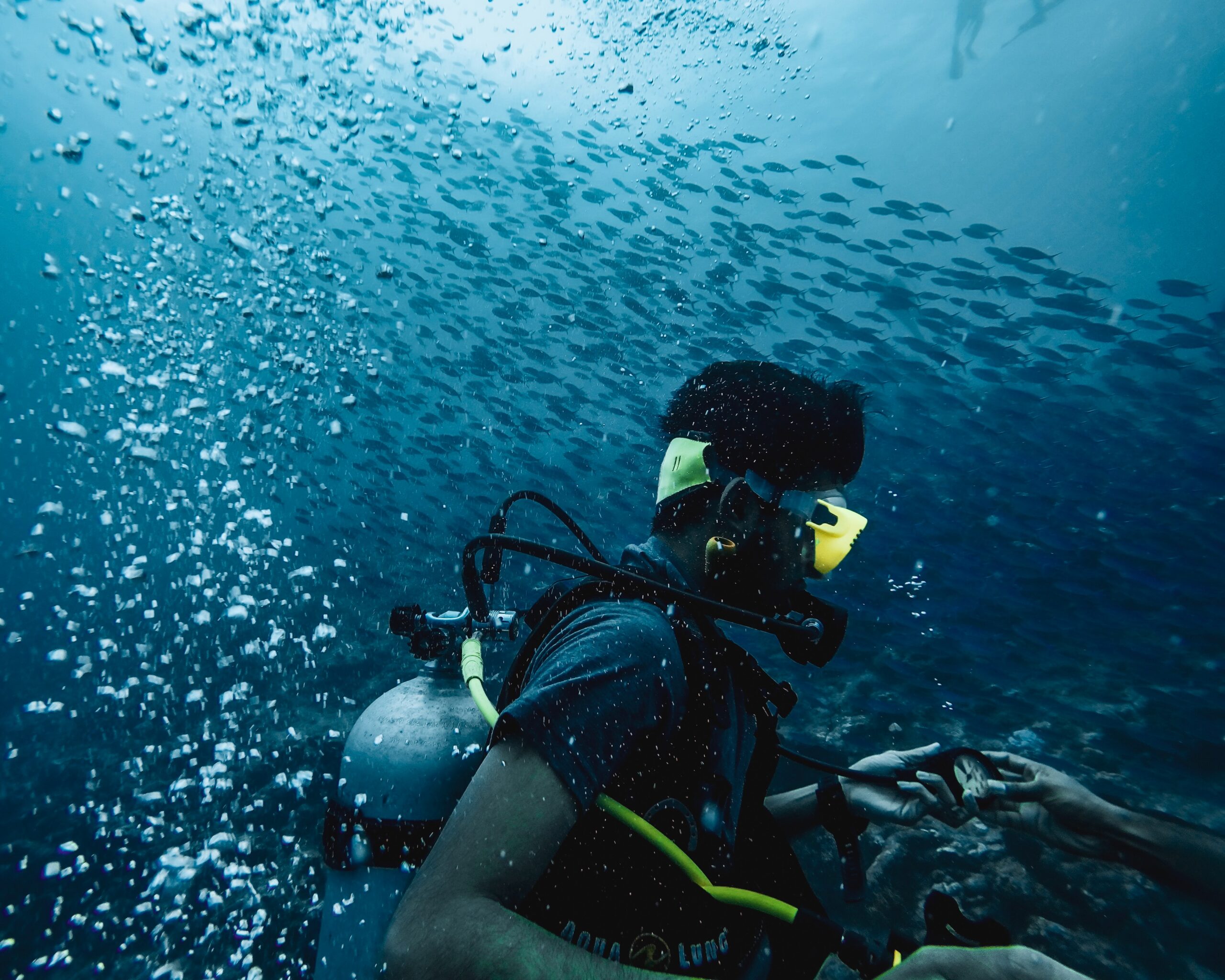Scuba Diving in Havelock is not about one single highlight, it’s all about variety (over 850 species found here). We are not a “big fish” destination, but we do have sites where you can spot 4-8 sharks on a single dive (and not just reefies, but also occasional bull sharks). Manta & dolphin sightings are quite frequent as well. Macro lovers – we have ghost pipefish, shrimps, nudibranchs, crabs and more, even though we aren’t a “macro only” destination, like Manado. We get some amazing coral, lots of fishlife (both in variety and quantity), some walls, some pinnacles, some deep dives in strong currents, some shallow relaxing dives – there is something here for everyone. We are biased but even after diving at places like the Red Sea, Sipadan and Mozambique, we feel Havelock matches up to all those destinations although in a different way, simply because there is something to see virtually every minute of the dive. And best of all – you will be diving these pristine, virgin reefs in small groups Havelock island is where every year more than 3000 Students complete their Scuba Diving Certification Courses and start their diving journey. Many Certified Divers around the world visit this island specially for fun diving to witness the variety of underwater life. More than a lakh of tourists visit this place every year. Most of the scuba industry flourishes here giving employment to many locals and people from different parts of the country . It’s the hub for Scuba Diving in India because of the rich underwater life here.
Up to date information on this can be found here
FOR CERTIFIED DIVERS: December to early May is our typical peak season. However, September to November offer excellent diving as well – as good, if not better than peak season diving, with massive schools of fish and a lot of action on the reefs. The catch is that it does rain intermittently during this time, so top-side weather can vary and we may be limited in our choice of dive sites. If you care just about diving, give it a shot though! May is another good time to come – usually, we start getting showers at this time, but the water is at its warmest and manta sightings are quite good at this time. June-August is usually rainy season and while we can dive, we cannot always go to our remote sites – however, over the past 4-5 years, June has consistently had relatively calm seas, and has offered really good diving – and we usually have very attractive stay+diving packages for that time, so this is a good way to get in some world-class diving for a relatively lower price. FOR BEGINNER DIVERS: The sites that we visit as part of the Intro to Scuba program and the Open Water course are accessible all year long, regardless of weather. Visibility is affected more by phase of the moon and tides, and so is variable all year long. As such, conditions for these programs are pretty consistent all year, and you can come whenever convenient. Rain doesn’t affect diving too much – especially the Intro to Scuba programs and the Open Water courses. It also has very little effect on visibility: rain only affects the surface, not what’s going on deep – we’ve had 30m vis while it has been pouring, and 5-6m vis during bright, clear days. Do note that over the past few years, as weather patterns become increasingly erratic, the gap between “peak season” and “off-peak season” (June-August) is becoming increasingly blurred.
Pretty much whenever you want. We have Open Water courses starting every 1-3 days. If you are short on time, email us and we’ll arrange to have a course starting for you as soon as you arrive – even if it means a private course (and there is no extra charge for that).
Please check our STAY page for information on ferry timings. In general we can help you make arrangements for ferry booking as per your flight schedule. We also offer Airport to Airport travel packages which include airport taxi – ferry – Havelock taxi- dive resort – same as above when going back. We can help you book your Port Blair stay as well or suggest good options to
Once you finalize your plans for Diving / Stay / Course, our team will reach out to you over email with the payment link / details to confirm your booking.
We take cash in Indian currency and foreign currency as well. Razorpay – Visa card, Master Card, Maestro Card, Rupay Card or Amex Card – 70+ Netbanking options – Paytm – Mobile wallets including Airtel, Mobikwik, Freecharge – UPI, NEFT, IMPS, and Paypal. – ( 18% GST applicable on the transaction fees.Transaction fee per transaction, 2% for every successful transaction, +1% on international cards, EMI and Amex ) – ( All credit cards, but not debit cards.)
Are you reasonably healthy, with no previous medical problems, and at least 8 years old? If this is more or less you, then YES ! You are welcome to experience the tailor made BOAT DIVE / TRY DIVE / DISCOVER SCUBA DIVE specially for you from Gypsy divers. There are no swimming skills required to experience your first Scuba Dive. With our 1:1 instructor to participant ratio, your Scuba Dive will be a safe and enjoyable experience.
Scuba Diving does not have a maximum age limit. If you are reasonably healthy, with no major medical problems or history or medication, anyone can dive. If you have minor medical issues but still want to experience the wonderful seas of Andaman, we suggest trying out our wonderful program for Snorkeling or Kayaking. With our 1:1 instructor to participant ratio, your Scuba Dive will be a safe and enjoyable experience.
No,assuming you have no irregularities in your ears and sinuses. The discomfort is the normal effect of water pressure pressing in on your ear drums. Fortunately, our bodies are designed to adjust for pressure changes in our ears – you just need to learn how. If you have no difficulties adjusting to air pressure during flying, you’ll probably experience no problem learning to adjust to water pressure while diving.
For Scuba Certification Courses, some swimming ability is required. You need to have basic swim skills and be able to comfortably maintain yourself in the water. Your PADI Instructor will assess this by having you: Any individual who can meet the performance requirements of the course qualifies for certification. There are many adaptive techniques that allow individuals with physical challenges to meet these requirements. People with paraplegia, amputations and other challenges commonly earn the PADI Open Water Diver certification. Even individuals with more significant physical challenges participate in diving.
Both PADI and SSI courses are very similar in content and application. Only with SSI you are not required to purchase any study material so there is a minor cost benefit (Except for the Divemaster course).
PADI Dive Center & Resort worldwide adhere to the same International training standards, so no matter where you are there’s likely a PADI Instructor ready to teach you how to scuba dive. We are a PADI Dive Resort & we’d love to welcome you for your Scuba Certification / learning.
Sunburn, seasickness and dehydration, all of which are preventable, are the most common problems divers face. Injuries caused by marine life, such as scrapes and stings, do occur, but these can be avoided by wearing an exposure suit, staying off the bottom and watching where you put your hands and feet.
When you’re lucky, you get to see a shark. Although incidents with sharks occur, they are very rare and, with respect to diving, if you see a shark it’s just passing through and a rare sight to enjoy.
People find the “weightlessness” of scuba diving to be quite freeing. Modern scuba masks are available in translucent models, which you may prefer if a mask makes you feel closed in. During your scuba diving training, your instructor gives you plenty of time and coaching to become comfortable with each stage of learning. Your scuba instructor works with you at your own pace to ensure you master each skill necessary to become a capable scuba diver who dives regularly.
Our dives take place in the earlier half of the day between 5 am to 1 pm. If you are doing the course, you may be required to spend more time later in the day depending on the progress of your theory and the Instructor’s schedule for you. Dive programs (Boat dive, try dive, Snorkeling, Discover scuba dive, Diving for kids) between 5:30AM to 1 PM Fun Dive between(certified Divers) 5:30AM to 1 PM
Snorkeling is swimming along the surface of the water and enjoying the underwater world equipped with a mask, a snorkel and swim fins. Snorkeling is often an underrated activity. For many travelers in tropic destinations, it’s presented as something anyone can do, and often involves plowing through the surface with rental gear and a swim vest on. But snorkeling can be so much more! Snorkeling can be a very rewarding activity. It benefits from its simplicity, where you can simply grab a mask and some fins, rather than hauling a bag full of heavy scuba gear This also allows for more flexibility, allowing you to bring your gear on trips where bringing tons of scuba gear isn’t a possibility. And the lack of bubbles means you can often get closer to marine wildlife than with scuba gear on.
Minimum Age: Our minimum age is 5 years old, Before deciding to bring a child canoeing or kayaking we ask that you consider the following: Is your child comfortable in the water? Do they know how to swim? Do they enjoy swimming, are they comfortable going underwater? Is it going to be too hot, too cold, too windy or just too sunny for a young child (are they heat tolerant)? Do you feel confident that you can manage yourself, your boat and your child if your boat flips over?
Yes Gypsy Divers offer Two types of kayaks. Premium Single seater Kayak Premium Dubble seater kayak. Please connect to Kayak section in website
NO, we do not encourage guests to do Fishing from our kayak while on ride.
If it has been more than a year since you last took a dive, it is recommended you undertake a ‘Refresher’ course to revisit standard scuba diving skills and procedures again. If you have booked fun dives with us, a refresher will be provided free of cost.
Ordinarily, you can do up to three dives in a day but that is subject to availability and prior booking. Sometimes it depends on your return Air Travel schedule plan.
You need to wait at least 12 hours before you can fly after a single dive and 18 hours before flying if you’ve done multiple dives.
Yes, absolutely. Rains do not affect underwater conditions significantly. The only impact rain has on diving is rough weather and choppy seas which might discourage long boat rides.
We charge ₹1500/day extra for visiting premium dive sites. All charges displayed on the website are subject to an extra 18% GST.
Trips are subject to weather conditions and may be canceled at the discretion of the Dive Center. Alternate days or refunds will be offered in the event of cancellations.
Sure you can! We recognize all training agencies & their relevant certification levels.
If for some reason, your course is left incomplete, you can complete the course with us at a later date within a period of 3 years (36 months). We offer a 3-year credit-shell for the same. While planning your subsequent travel to utilize the credit-shell, please write to us in advance about your travel plans and dates and we will help you schedule your course based on the availability.
Please note -
Accommodation charges are not part of the credit-shell and will need to be booked separately. Even if you had originally booked your accommodation with us at the time you could not complete the course, you will need to book your stay for your subsequent visit.
If you had only booked the course, then the credit-shell for your incomplete course gets activated and is valid for next three years.
An open-water or scuba diver training course consists of three parts:
- Coursework
- Confined-Water Dives
- Open-Water Checkout Dives
Many dive training agencies — including PADI — allow students the chance to complete much of their coursework (theory part) at home, leaving only in-water training and check-out dives to complete. The eLearning, or online coursework, takes students through the academic training with slideshows, videos and narration, making the curriculum interactive and more impactful.
Of course! Having a friend or family member working toward a scuba diving certification with you at the same time can make the experience even better. You’ll have a dive buddy from the get go!
No. Most recreational scuba certifications do not expire. However, it is important to keep up to date with your knowledge and skills to ensure a fun and safe dive.
Many operators will ask to see a log of your latest dive, and if you have not been in the water recently, you will have the chance to complete a skills check or refresher course.
PADI Five Star Dive Resorts are committed to providing quality diver training and continuing education programs that include dive experiences and environmental awareness. These dive businesses often cater to the traveling divers, diving commun, students, solo travelers, Adventure travelers, Same time these 5 star dive resorts offer the best accommodation, food facilities and travel logistics all under one roof which saves divers time, energy & best comforts.
While other hotel resorts focus on offering all premium luxury and facilities, a PADI 5 Star Dive Resort is focussed in making your dive vacation comfortable and convenient without the hassle of you running around and figuring out logistics for your dive, food and stay worries.
Foreigners are permitted to visit the following Islands without requirement of Restricted Area Permit- (1) East Island (2) North Andaman (3) Smith Island (4) Curfew Island (5) Stewart Island (6) Landfall Island (7) Ayes Island (8) Middle Andaman (9) Long Island (10) Strait Island (11) North Passage (12) Baratang (13) South Andaman (14) Swaraj Dweep (15) Shaheed Dweep (16) Flat Bay (17) North Sentinel Island (18) Little Andaman (19)Chowra (20) Tilang Chong Island (21) Teressa (22) Katchal (23)Nancowry (24) Kamorta (25) Pulomilo (26) Great Nicobar (27) Little Nicobar (28) Narcondum Island (29) Interview Island & (30) Wiper Island(Day visit only). Citizens of Afghanistan, China and Pakistan and foreign nationals having their origin in these countries would continue to require the Restricted Area Permit to visit Andaman & Nicobar Islands. In such cases, the Restricted Area Permit (RAP) would be granted only after prior approval of the Ministry of Home Affairs. If any such national is found visiting these Islands without the Restricted Area Permit, necessary penal action would be taken under the relevant provisions of the Foreigners Act, 1946. For immigration related information, please contact: Foreigners Registration Officer Immigration and Foreigners Branch, Ground Floor, Office of Superintendent of Police (South Andaman). Phone Nos.: (03192)237793 and (03192)234472 with extensions 358 & 374.




